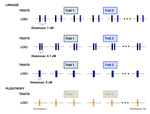
LOTTERHOS Kathleen
- Northeastern University Marine Science Center, Northeastern University, Nahant, United States of America
- Adaptation, Bioinformatics & Computational Biology, Evolutionary Applications, Expression Studies, Genotype-Phenotype, Non Genetic Inheritance, Phenotypic Plasticity, Population Genetics / Genomics
- recommender
Recommendation: 1
Reviews: 0
Recommendation: 1

Pleiotropy or linkage? Their relative contributions to the genetic correlation of quantitative traits and detection by multi-trait GWA studies
Understanding the effects of linkage and pleiotropy on evolutionary adaptation
Recommended by Kathleen Lotterhos based on reviews by Pär Ingvarsson and 1 anonymous reviewerGenetic correlations among traits are ubiquitous in nature. However, we still have a limited understanding of the genetic architecture of trait correlations. Some genetic correlations among traits arise because of pleiotropy - single mutations or genotypes that have effects on multiple traits. Other genetic correlations among traits arise because of linkage among mutations that have independent effects on different traits. Teasing apart the differential effects of pleiotropy and linkage on trait correlations is difficult, because they result in very similar genetic patterns. However, understanding these differential effects gives important insights into how ubiquitous pleiotropy may be in nature.
In the preprint "Pleiotropy or linkage? Their relative contributions to the genetic correlation of quantitative traits and detection by multi-trait GWA studies", Chebib and Guillaume [1] explore the conditions under which trait correlations caused by pleiotropy result in similar and different genetic patterns than trait correlations caused by linkage. Their main finding is that pleiotropic architectures result in higher trait correlations than do architectures in which completely linked mutations affect different traits. This results clarifies and goes against a previous theoretical study that predicted that pleiotropic architectures could not be distinguished from completely linked mutations that affect independent traits.
In genome-wide association studies (GWAS), it is difficult to know if a significant signal is a causal variant that truly affects the trait, a false positive neutral variant linked to a causal variant, or a false positive causal variant that affects a different trait but is significant because of trait correlations. In their study, Chebib and Guillaume [1] show that this latter category can be a common source of false positives in GWAS studies when mutations affecting different traits are linked. One of the main limitation of this aspect of their analysis is the lack of simulation of neutral loci, which would likely show even higher rates of false positives than reported in their study.
The main limitation in their study is the restrictive assumptions about the genetic architectures (e.g. all pairs of loci have a fixed recombination rate among them). In reality, new causal mutations that arise near another causal mutation may have higher or lower establishment probabilities depending on the direction of effects on the trait and the parameters for selection and demography. Their study still deserves a recommendation, however, because of the new insights it gives into the genetic architecture of trait correlations.
References
[1] Chebib, J. and Guillaume, F. (2019). Pleiotropy or linkage? Their relative contributions to the genetic correlation of quantitative traits and detection by multi-trait GWA studies. bioRxiv, 656413, v3 peer-reviewed and recommended by PCI Evolutionary Biology. doi: 10.1101/656413